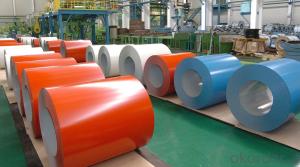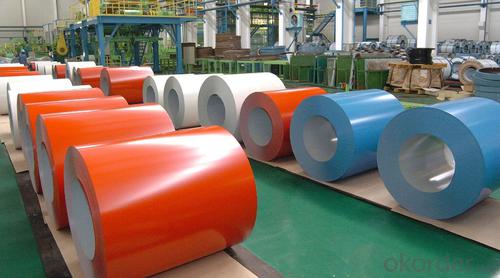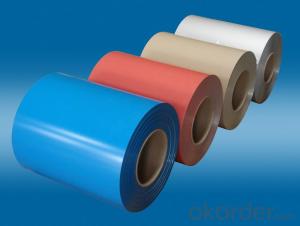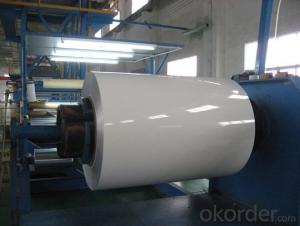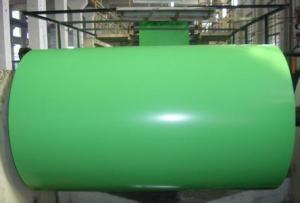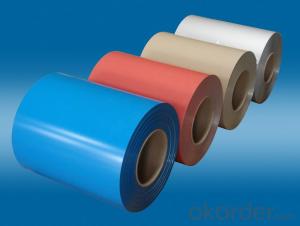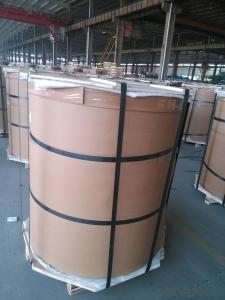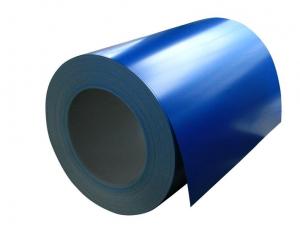Aluminum Coil White AA3003 Prepainted Aluminium Coils Used for Construction
- Loading Port:
- Shanghai
- Payment Terms:
- TT OR LC
- Min Order Qty:
- 5 m.t.
- Supply Capability:
- 10000 m.t./month
OKorder Service Pledge
OKorder Financial Service
You Might Also Like
Specification
1.Structure of AA3003 Prepainted Aluminium Coils Used for Construction Description
AA3003 Prepainted Aluminium Coils Used for Constructionare widly used in decoration field. For the painting, it depends on the using evironment. If you use in the open air, we recommend the PVDF coated aluminium coils. This kind of painting can last 15-20 years. If you use in the room, we recommend PE coated aluminium coils. The price is much more competitive.
Direct Continuous Aluminium Foil Stock in Coil is one semi-finished aluminium material. This strip can be rolled down to aluminium foil.The final thickess can be 5-20 microns. Aluminium foil is soft, ductile and with a silver-white luster which can be widely used in a large scare of fields.
2.Main Features of AA3003 Prepainted Aluminium Coils Used for Construction
a.Competitive price---We have our own mills and can produce mill finished aluminium coils, so we can control the production cost better.
b.Professional after-sale service---We have more than 15 years exportation experience and you need not worry about the exporation problems.
c.Fast delivery time---We can control the delivery time within 35 days.
3.AA3003 Prepainted Aluminium Coils Used for Construction Images
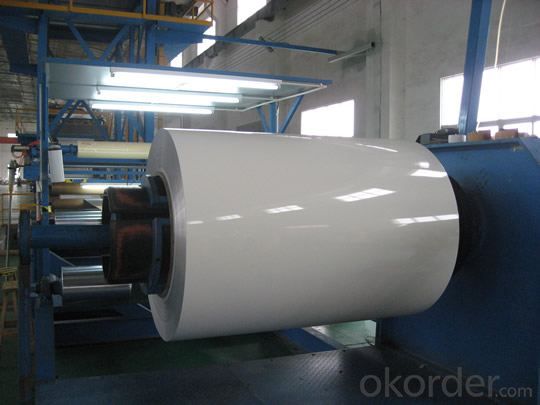
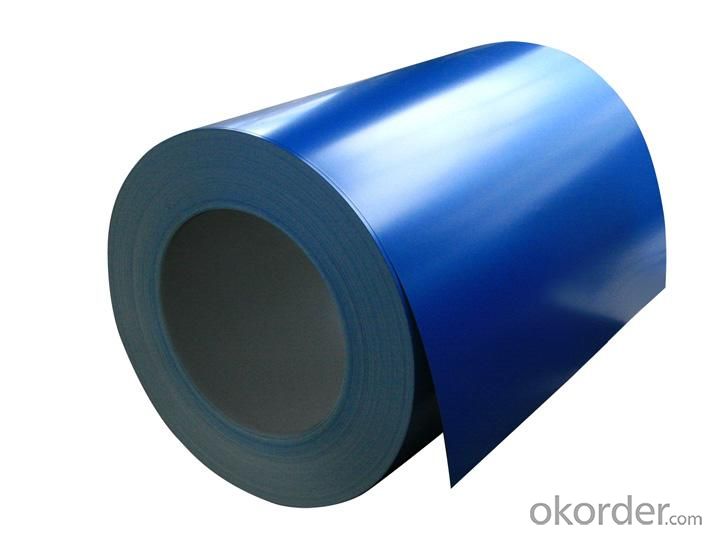
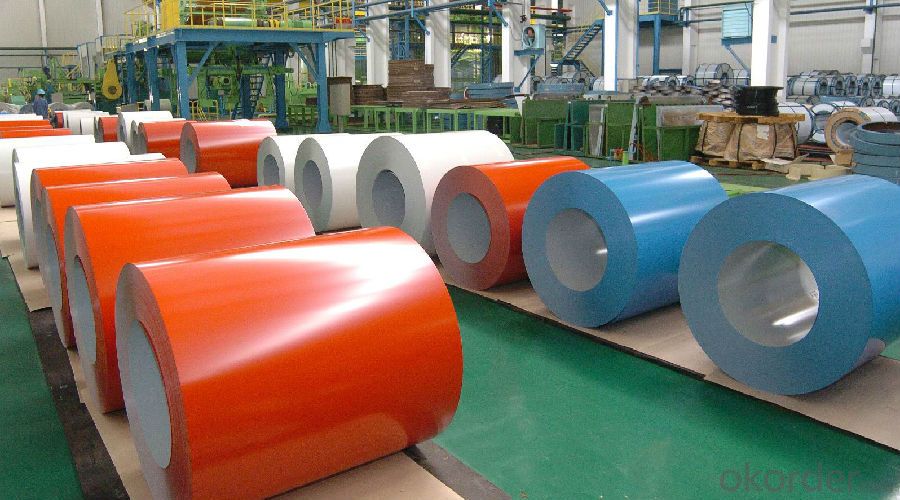
4.AA3003 Prepainted Aluminium Coils Used for Construction Specification
Alloy | AA3003 |
Temper | H14,H16,H18,H22,H24,H26,H32,O/F |
Thickness | 0.03mm-3.0mm |
Width | 30mm-1700mm |
Coating | PE,PVDF,Epoxy |
Painting Thickness | Standard 16-25 Mic, max 40 Mic |
Color | According to RAL colors or customers' samples |
Standard | GB/T 17748-1999 |
5.FAQ:
What is the quality standard?
---Usually our standard is GB3880-2006
What is the largest width?
---It is 2000mm
What is the MOQ?
---Usually we can accept 80 tons.
- Q: Can aluminum coils be used in the production of consumer goods?
- Yes, aluminum coils can be used in the production of consumer goods. Aluminum is a versatile material that is lightweight, durable, and corrosion-resistant, making it suitable for a wide range of applications such as cans, packaging, appliances, and automotive parts. The flexibility and formability of aluminum coils allow manufacturers to create various consumer products efficiently and cost-effectively.
- Q: Are aluminum coils suitable for coil slitting applications?
- Yes, aluminum coils are suitable for coil slitting applications. Aluminum is a lightweight, versatile, and corrosion-resistant material that can be easily slit into narrow strips without compromising its structural integrity. Aluminum coils are commonly used in various industries such as automotive, construction, and packaging, where precise and narrow strips are required for specific applications. Additionally, aluminum coils offer excellent formability and surface quality, making them suitable for coil slitting processes that require high precision and consistency.
- Q: What are the common surface treatments for aluminum coils in the automotive industry?
- In the automotive industry, aluminum coils undergo various surface treatments to enhance their performance and appearance. Some common surface treatments for aluminum coils in the automotive industry include: 1. Anodizing: Anodizing is a popular surface treatment for aluminum coils as it creates a protective oxide layer on the surface. This process involves immersing the coils in an electrolytic solution and passing an electric current through it. Anodizing provides corrosion resistance, improves durability, and allows for the application of dyes or paints. 2. Painting: Aluminum coils can be painted to provide an aesthetically pleasing appearance and protection against environmental factors. The coils are coated with a layer of paint, which can be solvent-based or powder-coated. Painting not only enhances the visual appeal but also adds a layer of protection against scratches and UV radiation. 3. Cladding: Cladding involves bonding a layer of aluminum alloy with different properties onto the surface of the coil. This treatment is commonly used to improve the strength, thermal conductivity, or corrosion resistance of the aluminum coil. Cladding can be done through various methods, such as hot rolling, cold rolling, or explosive bonding. 4. Clear Coating: Clear coating is often applied to aluminum coils to provide a transparent protective layer. This coating helps prevent corrosion, oxidation, and discoloration, while also preserving the natural metallic appearance of the aluminum coil. 5. Polishing and Buffing: Polishing and buffing are surface treatments that aim to enhance the surface smoothness and shine of aluminum coils. These treatments involve mechanically grinding or polishing the surface to remove imperfections, scratches, and oxidation. Polishing and buffing are commonly used for decorative purposes in high-end automotive applications. These are just a few of the common surface treatments for aluminum coils in the automotive industry. The choice of treatment depends on factors such as the desired appearance, performance requirements, and environmental conditions the coils will be exposed to.
- Q: What are the maximum operating temperatures for aluminum coils?
- The specific alloy and application used can determine the maximum operating temperatures for aluminum coils. In general, aluminum coils can endure high temperatures without significant degradation or performance problems. Common aluminum alloys like 3003 and 5052 have a maximum operating temperature of approximately 300-400 degrees Fahrenheit (150-200 degrees Celsius). These temperatures are suitable for most industrial and commercial uses, including HVAC systems, refrigeration units, and heat exchangers. Specialized aluminum alloys, such as 4004 and 4343, are designed for high-temperature applications. These alloys can withstand temperatures up to 550-650 degrees Fahrenheit (290-340 degrees Celsius) without significant structural or performance damage. It's important to note that the maximum operating temperature can vary depending on factors like coil thickness, heat transfer conditions, and duration of exposure to high temperatures. Therefore, it is advisable to consult the manufacturer's guidelines or perform temperature tests to determine the safe operating limits for a specific aluminum coil in a particular application.
- Q: How do aluminum coils contribute to noise reduction?
- Aluminum coils contribute to noise reduction in several ways. Firstly, aluminum is a lightweight material that can effectively absorb and dampen sound waves. When used in coils, it can help to reduce vibrations and minimize the transmission of noise. Additionally, aluminum has excellent thermal conductivity properties, which can help dissipate heat and prevent temperature-related noises. This is especially important in HVAC systems where the noise generated by the equipment can be significant. Furthermore, aluminum coils can be designed with special features such as grooves or fins that enhance their noise reduction capabilities. These features help to increase the surface area of the coil, allowing for better heat transfer and reducing noise levels. Overall, aluminum coils provide an efficient and effective solution for noise reduction in various applications, making them a popular choice in industries where noise control is crucial.
- Q: Does anyone know if aluminum skateboards are good?
- Yes aluminum skateboards are good and very light.
- Q: Can aluminum coils be used in outdoor applications?
- Indeed, outdoor applications can make use of aluminum coils. Given its remarkable resistance to corrosion, aluminum proves to be an appropriate material for outdoor purposes. It finds frequent employment within the construction sector for various outdoor structures, including roofs, gutters, and siding. Moreover, the lightweight and manageable nature of aluminum coils contribute to their widespread preference in outdoor applications. Nevertheless, it is crucial to bear in mind that the particular grade and thickness of the aluminum coil must be carefully evaluated to ensure its endurance against the environmental conditions unique to the specific outdoor application.
- Q: Explain the differences between aluminum coil and aluminum foil when used in food packaging.
- <p>Aluminum coil and aluminum foil are both used in food packaging but serve different purposes. Aluminum coil is typically thicker and more rigid, used for making aluminum cans and containers. It provides a strong barrier against light, air, and moisture, which is crucial for preserving the quality and freshness of food. Aluminum foil, on the other hand, is thinner and more flexible, often used for wrapping food to protect it from contamination and to retain heat or cold during cooking or storage. It's also used for baking and roasting to prevent food from sticking to the pan or to add a crispy texture. While both materials are recyclable and provide a barrier against external elements, their specific applications in food packaging differ based on their physical properties and the needs of the packaging process.</p>
- Q: Is it possible to use aluminum coil for crafting decorative items?
- <p>Yes, you can use aluminum coil to make a decoration piece. Aluminum is a versatile material that is lightweight, durable, and easy to manipulate. It can be bent, twisted, or cut into various shapes to create unique decorative items. Common uses include making sculptures, wall art, and even jewelry. Due to its malleability and resistance to corrosion, aluminum coil is an excellent choice for decorative purposes, especially for outdoor decorations where weather resistance is important.</p>
- Q: What is the typical conductivity of aluminum coils?
- Aluminum coils exhibit a relatively high typical conductivity, with a range of values between 34 and 38 million Siemens per meter (MS/m) at room temperature. Renowned for its exceptional electrical conductivity, aluminum finds extensive application in diverse electrical uses such as power transmission lines, electrical conductors, and coils. This notable conductivity enables the smooth and efficient flow of electric current through aluminum coils, rendering them apt for dependable and efficient electricity conduction.
Send your message to us
Aluminum Coil White AA3003 Prepainted Aluminium Coils Used for Construction
- Loading Port:
- Shanghai
- Payment Terms:
- TT OR LC
- Min Order Qty:
- 5 m.t.
- Supply Capability:
- 10000 m.t./month
OKorder Service Pledge
OKorder Financial Service
Similar products
Hot products
Hot Searches
Related keywords
